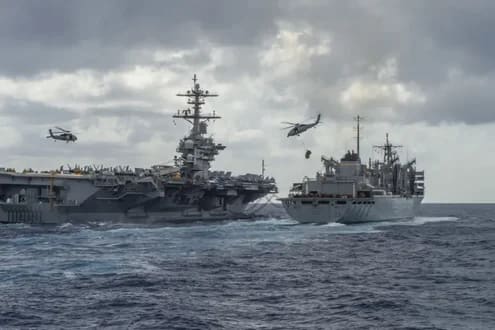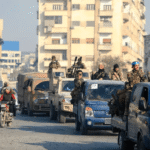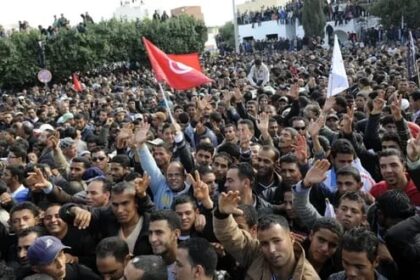Published on: May 20, 2019
مقالات ذات صلة:
Is a Military Confrontation Between the U.S. and Iran Imminent?
The recent escalation of tensions, the war of words, and mutual threats between the United States and Iran have reached new heights. The arrival of the USS Abraham Lincoln, one of the world’s largest aircraft carriers, in the Persian Gulf—armed with B-52 bombers capable of carrying nuclear warheads—marked a significant shift. This came just as the U.S. was preparing for the second phase of sanctions aimed at reducing Iranian oil exports to zero. Meanwhile, Iran threatened to close the Strait of Hormuz, a move that could trigger an unavoidable military confrontation, as many analysts predict. The U.S. Navy commander in the Middle East even hinted at deploying an aircraft carrier to the Strait of Hormuz, further fueling speculation.
A prevailing belief suggests that the U.S.-Iranian conflict will inevitably drag the region into another cycle of destruction, one from which recovery may be nearly impossible. Kuwaiti parliamentary officials have echoed these concerns. Those who subscribe to this view argue that the standoff will eventually lead to a military confrontation with devastating consequences for all parties involved.
However, to assess the likelihood of war, it is crucial to analyze how the U.S. has historically handled conflicts in the region and to understand the true nature of the U.S.-Iran relationship.
U.S. Strategy: A Lesson from Iraq
Looking at how the U.S. managed its conflict with Saddam Hussein’s Iraq provides valuable insights. In the 1980s, Washington executed a meticulously planned, long-term strategy with minimal losses, which can be summarized in three key stages:
1. Building Up Iraq as a Regional Power – The U.S. allowed Iraq to rise as a formidable force before dragging it into the Iran-Iraq War, which severely drained its economy.
2. The Kuwait Trap – Saddam Hussein fell into this carefully orchestrated trap, leading to his isolation and the subsequent U.S.-led embargo. Iraq was strangled by 13 years of sanctions that crippled its economy and military.
3. The Final Blow: Invasion – By 2003, Iraq was at its weakest, making it easier for U.S. forces to invade and topple the regime.
Applying this same pattern to Iran today, it becomes evident that the U.S. has, for years, allowed Iranian influence to expand—from Iraq and Lebanon to Syria and Yemen—just as it once permitted Saddam’s Iraq to grow. The purpose? To entangle Iran in multiple conflicts, draining it militarily and economically while fueling sectarian and ideological divisions in the region. At the same time, this strategy has helped the U.S. financially exploit Gulf states by selling them military protection against the so-called “Iranian threat.”
Who Benefits from the U.S.-Iran Tension?
The U.S. has used Iran’s regional ambitions to reshape the Middle East’s geopolitical landscape. One significant outcome is the unprecedented public alignment of Gulf nations with Israel, framed as a strategic necessity against a common Iranian adversary.
By fostering divisions and conflicts across the region, the U.S. ensures that no Arab state poses a long-term threat to Israel. At the same time, Iran has capitalized on these dynamics to expand its military capabilities and regional influence. However, Washington now sees Iran’s growing power as an issue—primarily because it poses a long-term threat to Israel.
This raises the question: Will the U.S. opt for direct military confrontation with Iran?
Why a War Is Unlikely—At Least for Now
If Washington were truly planning a military attack on Iran, it would first weaken Tehran’s regional influence—particularly in Yemen and Syria—where Iran’s proxies remain strong. However, this has not happened, at least not yet. For the U.S. to launch a successful strike, it would need to:
• Neutralize Iraq’s Role – Ensuring that Iraq does not serve as a strategic asset for Iran.
• Cut Off Iran’s Regional Proxies – Dealing with groups like Hezbollah, the Houthis, and various Iraqi militias that could retaliate.
• Secure Energy Supply Lines – Preventing Iran from disrupting global oil markets, as seen when drones targeted Saudi oil pipelines in the Red Sea.
Moreover, Iran has several counter-strategies at its disposal. It could, for example, turn Iraq into a battleground against U.S. interests, as seen during the Iraq War. Tehran could also escalate attacks on maritime routes, not just in the Strait of Hormuz but also in the Bab el-Mandeb Strait via its Houthi allies.
Even if Iran were cornered, war would still be unlikely. While sanctions will hurt, they will not destroy Iran. Major players like China and Russia will continue to buy Iranian oil, preventing Tehran’s economic collapse. If the U.S. attempted to block Iranian oil shipments, Iran could simply sail under Russian or Chinese flags—similar to how Kuwait avoided Iranian threats during the Iran-Iraq War. This makes the U.S. goal of reducing Iran’s oil exports to zero highly unrealistic.
Additionally, there are serious doubts about whether Saudi Arabia and the UAE can fully compensate for the loss of Iranian oil in global markets, further complicating Washington’s strategy. Iran is well aware that initiating a war would leave it at a severe disadvantage, which is why it prefers strategic maneuvering over direct confrontation.
Why Has the U.S. Sent Military Reinforcements to the Gulf?
If a full-scale war is unlikely, why has the U.S. deployed such a large military presence in the region?
The answer lies in the various forms of warfare. Military confrontation is only one aspect—others include economic, psychological, and cyber warfare. The presence of U.S. warships in the Gulf serves multiple objectives:
1. Psychological Warfare – To intimidate Iran and pressure it into negotiations or concessions.
2. Economic Pressure – To reinforce the perception of imminent conflict, which affects Iranian financial markets and weakens investor confidence.
3. Strategic Posturing – To force Iran to divert resources away from its regional proxies, weakening its overall influence.
What Is Happening Now?
The U.S. is showcasing its military strength to avoid war, not start one—a well-documented strategy in American foreign policy. Instead of engaging in costly military action, Washington prefers economic strangulation, which could push Iran’s already strained economy to the breaking point. The hope is that over time, domestic unrest will lead to an internal uprising—a “revolution of the hungry”—that topples the Iranian government without direct U.S. intervention.
Even if that does not happen, prolonged economic pressure could make a military intervention less risky and more cost-effective, just as it did in Iraq.
Conclusion
While tensions between the U.S. and Iran remain high, an immediate military confrontation is unlikely. The U.S. has historically preferred long-term containment strategies over direct wars, using economic sanctions, diplomatic isolation, and proxy conflicts to achieve its goals.
Iran, despite its aggressive rhetoric, understands that a direct war would be devastating. Instead, it will continue maneuvering through diplomatic loopholes, leveraging its regional allies, and finding ways to bypass sanctions.
For now, what we are witnessing is a carefully calibrated standoff—one in which both sides are flexing their muscles but neither is ready to pull the trigger. However, if Iran’s regional influence continues to grow unchecked and if Israel perceives an existential threat, the risk of conflict could rise in the coming years.














